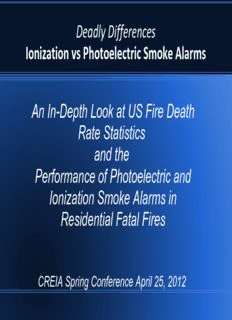
Ionization vs Photoelectric Smoke Alarms PDF
Preview Ionization vs Photoelectric Smoke Alarms
Deadly Differences Ionization vs Photoelectric Smoke Alarms An In-Depth Look at US Fire Death Rate Statistics and the Performance of Photoelectric and Ionization Smoke Alarms in Residential Fatal Fires CREIA Spring Conference April 25, 2012 Deadly Differences Ionization vs Photoelectric Smoke Alarms Skip Walker ACI, ASHI Certied Inspector MCI, CREIA Master Inspector ICC Certified Residential Combination Inspector F.I.R.E. Service Certifed Inspector Published 18 Articles, 4 on Smoke Alarms and CO Issues Presented to California Association of Realtors (CAR), Risk Management/Consumer Safety Committee Presented to National Association of Realtors (NAR), Risk Management/Consumer Safety Committee Interviewed by SF Chronicle for Smoke Alarm Article CREIA Spring Conference April 25, 2012 Skip Walker, MCI, ACI Deadly Differences Ionization vs Photoelectric Smoke Alarms What We Will Talk About Today: US Residential Fire Death and Injury Statistics 1960-2001 Statistical Data, Trends and How to Interpet the Data A Brief History of Smoke Alarms The Types of Smoke Alarms Found In Residential Use Contrast the Performance of the Different Alarm Technologies in Residential Fatal Fires CREIA Spring Conference April 25, 2012 Skip Walker, MCI, ACI Deadly Differences Ionization vs Photoelectric Smoke Alarms Important: All the Data Used Comes From Reputable Sources All Data Is Published & Verifiable NIST National Institute for Standards and Testing NFPA National Fire Protection Association CPSC Consumer Product Safety Commission FEMA Federal Emergency Management Agency UL Underwriters Labratory Texas A&M University NFA National Fire Administration NCHS National Center for Health Statistics NIFRS National Fire Incident Reporting System CREIA Spring Conference April 25, 2012 Skip Walker, MCI, ACI Deadly Differences Ionization vs Photoelectric Smoke Alarms Let's Look At the Death/Injury Statistics and the Data Sources: NFPA, Fire Loss Survey's and Various Study's - Survey of 3,000 Fire Departments Nationally – Mostly Larger NFIRS, National Fire Incident Reporting System - Web Input System -Voluntary Participation – Currently About 18,960 Fire Departmants -Participation Varies By State NCHS, US Death Statistics Report - National Records of Death Certicates -Cause of Death Classifications Limited CREIA Spring Conference April 25, 2012 Skip Walker, MCI, ACI Deadly Differences Ionization vs Photoelectric Smoke Alarms None of the Data is Perfect They Are Estimates Only – Not Absolutes - Numbers Vary Between Each Source - Year to Year - Sometimes Significantly CREIA Spring Conference April 25, 2012 Skip Walker, MCI, ACI Deadly Differences Ionization vs Photoelectric Smoke Alarms NFPA and NFIRS Data: Participation is Voluntary Statistical Reports Include Extrapolated Data Unknown Fire or Death Causes Are Reaporioned to Other Other Causes Methods Used Are Sometimes Inconsistent Between Years/ Reports Fire/Death/Injury Rates Are Estimates Only – Not Absolutes Data Set Is Large Enough To Have A Degree Of Confidentce In The Data It Is Important to Understand the Limitations Of The Data CREIA Spring Conference April 25, 2012 Skip Walker, MCI, ACI Deadly Differences Ionization vs Photoelectric Smoke Alarms NCHS, National Center for Health Statistics US Death/Morbidity Statistics Report The National Record of Death Certicates Cause of Death Classifications Limited I.e. Respitory Failure from Smoke Inhilation Can Be Used To Fill In Blanks From NFPA, NFIRS Data CREIA Spring Conference April 25, 2012 Skip Walker, MCI, ACI Deadly Differences Ionization vs Photoelectric Smoke Alarms Caution must be used with statistical systems that allow voluntary/self-selection of participants. There is inherent bias in the statistical data. Only those that choose to participate do. Example: With NFIRS, since it is web based, only fire departments with web access can participate, etc. CREIA Spring Conference April 25, 2012 Skip Walker, MCI, ACI Deadly Differences Ionization vs Photoelectric Smoke Alarms The Goal Today Is Very Simple
Description: